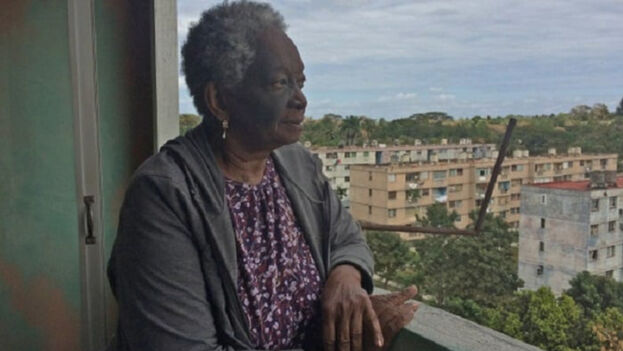
![]() 14ymedio, Havana, 14 December 2021 — On Monday afternoon the poet Georgina Herrera died due to complications from the coronavirus, several days after having been admitted to the Salvador Allende hospital, La Covadonga in Havana. “Today, in Cuba, from covid, the great poet has just died,” Puerto Rican writer Mayra Santos-Febres said in a post. “She was my elder. Now she is my Ancestor. I’m going to miss you, Yoya.”
14ymedio, Havana, 14 December 2021 — On Monday afternoon the poet Georgina Herrera died due to complications from the coronavirus, several days after having been admitted to the Salvador Allende hospital, La Covadonga in Havana. “Today, in Cuba, from covid, the great poet has just died,” Puerto Rican writer Mayra Santos-Febres said in a post. “She was my elder. Now she is my Ancestor. I’m going to miss you, Yoya.”
Santos-Febres met Herrera in 2016, “one of the most genuine voices in 20th century poetry,” as recognized by the official press. “She (Herrera) healed me with a few words of a pain that I did not know I carried,” she said, in addition, remembering that one of the dreams of the Cuban writer was to travel to Puerto Rico. “I looked for how to bring her on several occasions, but I wasn’t able to manage it. Damn international policy that divides us into nationalities, sides, ideologies.”
Herrera’s literary heritage is accentuated by her feminist emphasis and the racial awareness that she places on black women. This, Cubadebate published, “marked her close relationship with Africa and the vital heritage in Cuba, where she also worked as a scriptwriter for radio and television programs and film projects.”
Originally from Matanzas, Herrera was born on April 23, 1936 in the town of Jovellanos, and grew up in a family environment composed mostly of descendants of slaves. Her prolific career began at the age of 16, when she began to publish in newspapers and magazines in Havana. Later she was part of the legendary literary group El Puente [The Bridge].
Her sensitivity and wisdom took her to literature where she was recognized as the Eterna Cimarrona of Cuban letters. In 1970 she was honored with the poetry award from the Union of Writers and Artists of Cuba. And she came to preside over the Writers Section of the Film, Radio and Television Association. However, she was never awarded the National Prize for Literature, a fact that has been harshly criticized by her followers.
“Simple and at the same time irreverent in her texts, she places in front of us a lyrical subject that celebrates irreverence, the poetic and cultural maroon,” is how the Cuban essayist Alberto Abreu Arcia defined the personality of Georgina Herrera in his social networks . “A voice that dislodges and subverts everything.”
Cuban poet and editor Teresa Melo shared her feelings on her Facebook wall: “Multiple voice, woman written from her skin, her skins. Woman who wrote ‘how bad it is to die’, anticipated. Although it is now when she enters the river, where it is jungle, where she loves like a small stone, in rebound, in rebirth.”
Herrera’s work has been translated into several languages; titles include Gentes y cosas (1974), Granos de sol y luna (1978), Gatos y liebres (1978), Grande es el tiempo (1989), Gustadas sensaciones (1996) y Gritos (2004)*. Among her recognitions, most notably she received the Alejo Carpentier and Raúl Gómez García medals as well as the Distinction for National Culture.
*People and Things (1974), Grains of the Sun and Moon (1978), Cats and Hares (1978), Great is Time (1989), Gustadas Sensations (1996) ) and Screams (2004)
____________
COLLABORATE WITH OUR WORK: The 14ymedio team is committed to practicing serious journalism that reflects Cuba’s reality in all its depth. Thank you for joining us on this long journey. We invite you to continue supporting us by becoming a member of 14ymedio now. Together we can continue transforming journalism in Cuba.
